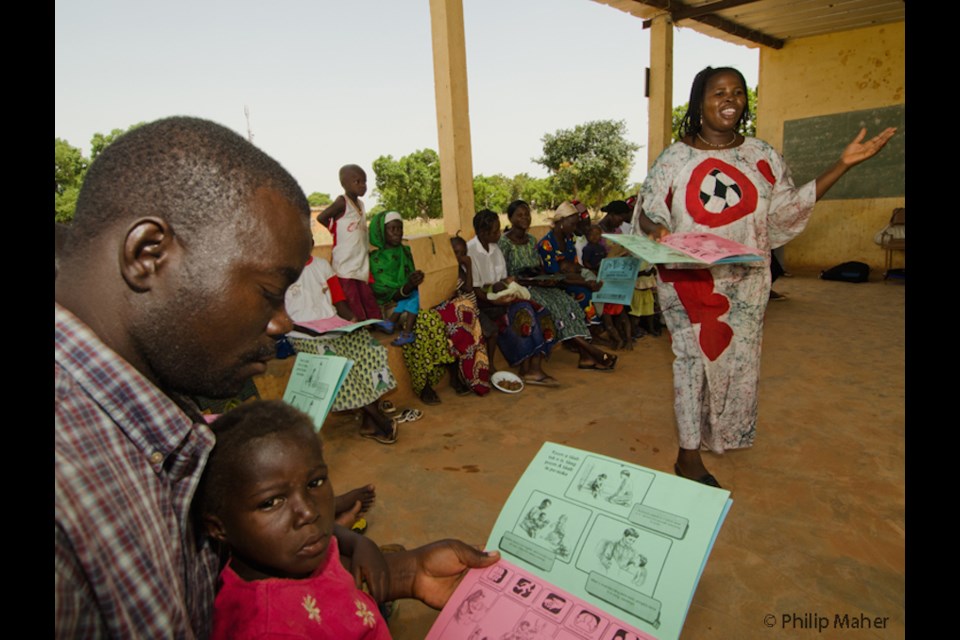The North American school rush has already begun. Buying books, shiny new shoes and discovering what friends are in your classes is all part of the ritual here in Guelph, whether in grade school, high school, the university or elsewhere.
I have a somewhat conflicted relationship with my own education. Despite my ability to read early, I found school boring and I constantly daydreamed, or so they told me. I’m not good at colouring within the lines. As a consequence, I failed every grade (really!) in public school. My poor performance was frustrating to the teachers. Some teachers didn’t even bother to mark my papers. Once I figured that out, I realized a D+ was all I needed to scrape by, and mostly, I did not even achieve that! My motto was aim low. I was successful.
My empathy for those struggling with school took on a more meaningful and worthwhile direction as I started to travel and observe education around the world.
My most emotional experience with school was speaking to one of the first all girls’ classes in Northern Afghanistan sponsored by the aid group World Vision. Since they were prevented from attending school earlier, their ages ranged from 13 to 18, for the same grade. It took no small measure of commitment for those girls to sit on a cold stone floor wearing gloves. Each day, a clanging artillery shell, hung on a wire, summoned them to class. When alone, I found myself weeping as I thought about what they had been through—their bravery and their hunger for learning. They did not take school for granted.
While parents around the world generally value education, they do not always understand the value of play at a young age.
Moms and dads often focus on getting children ready for tending goats, or fetching water or firewood. To help them learn the value of play, Christian Children’s Fund in West Africa teaches families the importance of making simple toys, like a rattle from a rock-filled plastic bottle, or stacking bottle caps. In Peru, we taught parents to make brightly coloured toys from readily available Alpaca wool.
Men also attended these classes for parents, usually arm-twisted by their wives. One African man said, “I never realized how important it is to play with our children.” Mothers are taught how they can help their children develop by singing to them while babies are on their backs. Education begins early for us all.
Teachers use a variety of means to help students learn. Outside a school sponsored by PLAN, in the dry area of North Africa, scraps of paper hang from saplings. Children’s names on the paper identify who is caring for the tree. This way, the students learn about the environment but they also gain pride in showing off their healthy tree.
A few years ago, I was on a school speaking tour across New Zealand. Sometimes I’d have the privilege of talking to special classes for “under achievers”—usually boys. These were battle-hardened, cynical kids. I’d share stories about my misadventures travelling to hot spots around the world. Boys being boys, it energized them. Then I’d tell them about my lacklustre academic record at their age.
They were surprised. Teachers told me they could see wheels turning in their heads as “underachievers” began to see how they could have a vision for their lives. They could actually rise from the ashes to do something worthwhile and perhaps most important, avoid being disappointed with their own future.
I’ve stood in probably hundreds of classrooms around the world on most continents—thatched roofs, tin roofs, or no roof at all—under the shade of a huge baobab tree in Africa.
A dedicated teacher attended each classroom. They often sacrificed their lives by living in rough, rugged conditions in a simple teacher’s home of mud or sometimes brick constructed by the rural community.
As we go through September in North America, my thoughts today are with the educators, in Wellington County and around the world.
My best advice on learning came from a Guelph teacher. When we apologetically informed the school that my kids had to miss a month of school to take them to Africa, my daughter’s teacher quickly responded, “School is important, but it is not the only place to learn things.” She was wise—I was focusing on the class, but she was focusing on learning. Classes end, learning is forever.
No matter where you are in the world or what you are studying, teachers have it tougher than ever before. The days of the “schoolmarm” are long gone, like chalk wiped from a blackboard. Today, educators must deal with guns, ethnic diversity, new curriculums and maybe the worst of all, some of us parents.
As for me, I eventually received two university degrees. A teacher saw my potential.
So as we go through the autumn, I hope you’ll thank a teacher, professor or educator for their desire to make a difference in our world. Almost everything begins with education. If done right, it seems to me the best education teaches us that learning never ends.
